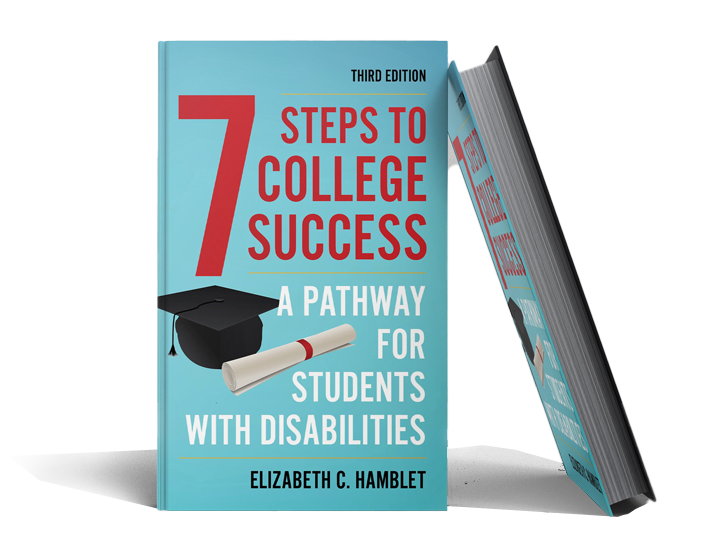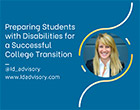Introduction
When students with learning disabilities (LD) start their college search, they may be thinking about what supports colleges will provide them. Some will look for college lists online; these tend to focus on colleges that offer well-known fee-based programs, but many students don’t need or want the level of support these programs provide.
My counselor search advice
For those not focused on schools with special programs, I recommend beginning a list with the typical things students look for and then researching the disability accommodations and supports at each of the schools that makes the list. See my advice on Understood and additional tips on my site here. (I don’t do college admissions consulting, but I’ve worked in college disability services offices since the late 1990s.)
Once students compose a list, they can do online research to see what the disability services (DS) offices at the colleges students are looking at say on their pages. For example – do they seem welcoming? Do they provide a helpful list of accommodations? Do they provide services students don’t see elsewhere? I provide a free form you they can use to do this research. And see a written post and/or a video suggesting what to explore.
College search resources
One resource students can use to get a hand in gathering this information is the K&W Guide to Colleges for Students with Learning Differences (#ad) This book provides basic information about several hundred colleges, such as cost, number of students attending, etc. The authors gather information from schools via questionnaire; when schools provide this information, K&W lists the accommodations DS offers. And if a school offers a fee-based program, it includes some information about that (including costs and an overview of the special services the program provides. You can ask your local independent bookstore to order this for you. Don’t have one? Give an independent bookstore credit for your purchase.)
There are two databases students can access for free, too. One is CeDaR and one is CollegeWebLD.
What to know about qualifications
Families may decide to hire a consultant to guide them through the process and help them figure out the best fit. As they start to search for someone, they may find that counselors say that they help all kinds of students or say that they’ve helped hundreds of students with learning disabilities. How can families be sure that they really have specialized knowledge and experience?
Independent college counselors don’t have to be certified or licensed by the state, and they are not required to have any special training in working with students with disabilities. The only professional organization for counselors that checks on the experiences of those who say they can help students with learning disabilities is the Independent Educational Consultants Association (IECA). You can see the questions counselors applying for this sub-specialty have to answer here. on pages 7-10 of IECA’s specific Best Practices for consultants whose profile carries the LD sub-specialty.
Families can search for IECs who specialize in helping students with LD here. (They can select “college” from the drop-down options under “Specialty Code” on the left and then use the “College Sub-Specialty” drop-down option on the right to select for LD.) Many of the consultants work remotely, so families shouldn’t worry if they can’t find someone nearby.
Of course, not every counselor belongs to IECA, and that doesn’t mean that they don’t have the specialized knowledge families seek. So how can families make sure they are educated consumers when choosing someone who hasn’t been checked by IECA? Or if they are considering a few IECs with the LD sub-specialty, how can they narrow their list?
Tips for finding a learning disabilities consultant
Joan Casey, founder and president of Educational Advocates, has written a really helpful post offering families 6 questions they can ask when considering an independent consultant to help with students’ college search. Casey has been in the field a long time, and she chaired IECA’s learning disability committee. Read her post.
I have suggestions to add to Casey’s excellent ones to help families narrow their choices.
They can think about whether they want a consultant who is really focused on serving students with LD, or are okay with hiring someone who does this as one of their many areas of practice. To get a sense of this, they can explore the websites of the consultants they are considering hiring to see how much they emphasize their LD credentials.
They may look for a page dedicated to explaining how they work with students with LD, if the consultants belong to LD-related organizations like the International Dyslexia Association, if they blog about their work with students with LD, etc. If consultants’ sites don’t have these elements, it doesn’t mean that they can’t be helpful. This is just my suggestion for one way to help families think about what they want, and to research a little further if they decide they want someone who really focuses on students with LD.
Additionally, I think families should be wary of consultants who emphasize only colleges that offer fee-based programs or Beacon and Landmark (the only two colleges in the country just for students with LD, ADHD, and autism spectrum disorders).
My list of recommended college search consultants
Throughout my work, I’ve had the pleasure of getting to know and collaborate with a number of consultants. See the counselors I recommend based on my personal knowledge of their work. You can tell them you found them on my site. (I don’t get a referral fee; I just like for people to know I recommended them.)



